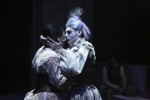UCLA’s Department of Theater is running a gender-swapped rendition of “The Revenger’s Tragedy.” Director Lisa Wolpe and actors Zuri Adele and Edward John Cabasal express the challenges of producing a gender-swapped play. Wolpe hopes the audience will notice the clear parallels she drew between past and present rape culture. The play will be running in Freud Playhouse from Dec. 5 to 13.
—
TRANSCRIPT:
RAFIQI: In the back of the Freud playhouse, behind thick black curtains, is a small circular space. A floral painted stage fills up one corner of the room. Here, UCLA School of Theater, Film and Television is presenting a gender-swapped rendition of “The Revenger’s Tragedy.” The play was chosen by Michael Hackett, the chair of the Department of Theater, and is directed by Lisa Wolpe.
WOLPE: The Revenger’s Tragedy is about rape culture and it’s completely unapologetic.
RAFIQI: The Revenger’s Tragedy is a 17th century play that follows the lead character on his quest for revenge for the rape and murder of his wife. By gender-swapping the roles in the play, Wolpe aims to parallel past and present rape culture.
WOLPE: There’s a general exaltation of glee at the power over women in the story and then the womens’ roles are underwritten. So, it’s really interesting for male actors in an MFA program to deal with having short scenes with few lines and underdeveloped personalities. And, so they’re really revealing to us for the first time what it’s like to sit inside a female ingénue role and chaffe at the lack of language or positive action that those girls were afforded given the scripts they were handed.
RAFIQI: Edward John Cabasal, who plays Lady Antonia, is one such actor.
CABASAL: It’s different, there’s a different power that I have to access. // There are a lot of privileges that I am afforded as a male that I just don’t know about, or at least I wasn’t wary of until I had to play this role. // Women were afraid of a lot of things. Women got raped quite often, women got killed very often.
That lack of freedom was very new to me. Just certain things I couldn’t do. Especially even just wearing a corset where even a woman’s breath is limited. So much of what women embodied back then is just this very very tiny, exasperated cage and putting myself in there was, was pretty tough.
ADELE: Playing a man has given me a lot of physical challenges. I didn’t realize as women how much we apologize with our physicality, but learning the physicality of this male character I have to be very direct.
RAFIQI: Zuri Adele, a female actress playing a male character in this production, gives her own point of view.
ADELE: The most challenging part about this play is that it’s so dark and there’s so much joy in committing evil acts that we have to strip this sense, especially as women playing men, this sense of trying to be cute, trying to be likable and just go for the grungy, dirty, evil revenge of it all.
RAFIQI: On the side of the stage, Wolpe works with lighting designer Ginevra Lombardo to ensure everything transitions smoothly during rehearsal.
WOLPE: They all are being very courageous and I feel liberated being asked to direct a gender-crossed project, when for the last twenty years I have been trying to hold up women playing men. Certainly men have played women for hundreds and hundreds of years but women were denied access to the stage for a long time. So I think it’s great that one of our leading institutions, UCLA, is asking for more inquiry and leadership.
RAFIQI: The Revenger’s Tragedy, which began its two-week run on the 5th continues its run at UCLA through Dec.13. Wolpe had this to say about her prospective audience:
WOLPE: I don’t know what people will take away from this play, I’ve cut it to 80 minutes, I’ve changed the ending, I’ve made it more hopeful, I’ve brought in the presence of the divine feminine, I’ve asked for divine justice and I’ve written it into the script. I think it’s a great example of politics in action in the theater. I hope people will respect it and realize how much hard work it was for these artists to take a walk in someone else’s moccasins.
RAFIQI: For Daily Bruin Radio, this is Sarah Rafiqi.
